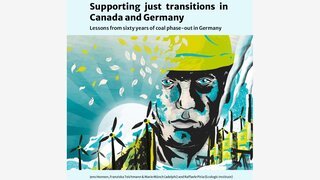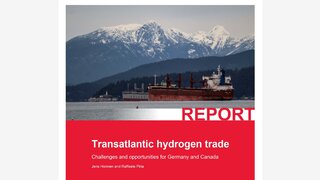Publications
Supporting just transitions in Canada and Germany

Through their Energy Partnership, Germany and Canada are collaborating on a just transition in the energy sector. This study aims to contribute to a better understanding of the challenges in achieving a just transition, analysing Germany’s sixty-year experience in managing the decline of its coal sector and highlighting key lessons-learned for policy-makers.
Taking a long-term perspective, Germany’s coal sector – which employed 600,000 people at its peak in the 1950s – offers an interesting case study of a modern energy industry having undergone far-reaching structural change over six decades. The lessons drawn from the decline of the industry as well as from the policy measures and strategies employed are useful for policy-makers in Canada and other countries, who work on the coal phase-out or the transformation of other traditional energy sectors.
Green hydrogen imports from Canada for Germany’s energy transition

Slide deck on the potential and complementary interests of Canada and Germany in establishing a transatlantic renewable hydrogen supply chain.
Transatlantic hydrogen trade

This paper discusses the opportunities and challenges of transatlantic hydrogen trade as well as how the Canadian-German Energy Partnership can support the establishment of transatlantic hydrogen trade.
Germany and Canada have both published ambitious hydrogen strategies and made hydrogen key to their bilateral cooperation. A look at both countries’ hydrogen strategies reveals complementary interests. To decarbonise the hard-to-abate sectors of its economy, Germany will have to rely largely on hydrogen imports in the future. Canada could be a promising hydrogen supplier – especially its Atlantic provinces have a particular advantage for green hydrogen production and export. For Canada, green hydrogen offers a new export opportunity for its energy sector in a world progressing towards climate neutrality. The country could capitalise on its energy sector’s strength, infrastructure and skilled workforce to export green hydrogen to Germany and Europe, diversifying its market beyond traditional energy products and partners.
A number of action items for the Energy Partnership are recommended in order for Germany and Canada to realise their opportunity for the joint development of a long-lasting, mutually-beneficial hydrogen trade relationship.
Hydrogen in Canada

This study explores the hydrogen industry, policy and debates in Canada, Germany's import potential for hydrogen from Canada as well as opportunities for bilateral cooperation.
In the study, the authors address the Canadian hydrogen sector and pilot projects (Chapter 1), the Canadian hydrogen strategy published in December 2020 (Chapter 2), the interests and requirements at the provincial levels (Chapter 3), the potential for hydrogen production using renewable energy along with production costs and future export opportunities (Chapter 4), as well as the opportunities for cooperation with Germany (Chapter 5).